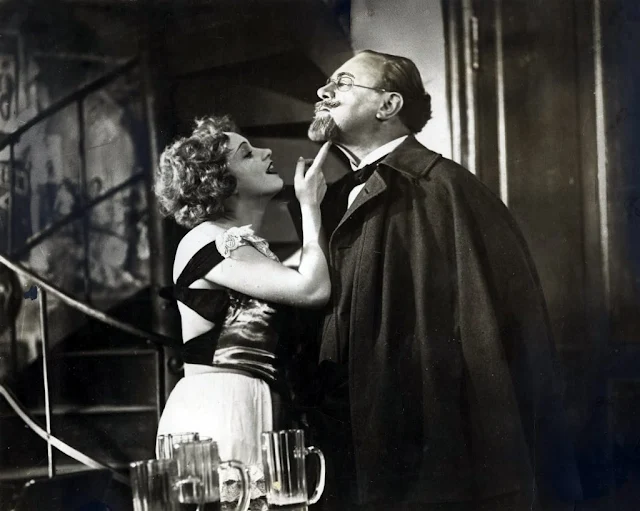 |
| Emil Jannings in The Last Laugh |
Cast: Emil Jannings, Maly Delschaft, Max Hiller, Emilie Kurz, Hans Unterkircher, George John. Screenplay: Carl Mayer. Cinematography: Karl Freund. Production design: Edgar G. Ulmer. Film editing: Elfi Böttrich.
F.W. Murnau's landmark film The Last Laugh tells a simple story: An elderly, preening doorman (Emil Jannings) at a luxury hotel struggles to unload a large trunk one rainy evening, and the hotel manager (Hans Unterkircher) takes notice. The doorman goes home to his apartment building where he's greeted with the usual deference accorded to his regal bearing and his brass-buttoned uniform. But when he returns to work the next day he finds a new doorman wearing a copy of the uniform. The hotel manager tells him that he's been replaced, and to turn in the uniform and report to his new job: lavatory attendant. Appalled and crushed, he swipes his old uniform and goes home that night wearing it as if nothing has happened. His niece (Maly Delschaft) is being married. and the ex-doorman celebrates well into the night. Still tipsy the next day, he goes back to the hotel and his new job, stashing the uniform in a checkroom at the railroad station. He bumbles through his duties, but when he returns home he's mocked by his neighbors, who have discovered his fall from grace. The next day he's even more disenchanted with his new job, and incurs the anger of a patron who reports him to the hotel manager, who reprimands him. That night he stays in the washroom, where he's found by the night watchman (Georg John), who helps him retrieve the old uniform and return it to storage. Exhausted, he falls asleep in his chair, and the night watchman tenderly covers him with his coat. And that's where the one and only intertitle occurs: It proclaims that this is where the story would most likely end in reality, with the lavatory attendant living out the rest of his days with "little to look forward to but death." But instead, "The author took pity on him ... and provided quite an improbable epilogue." In short, the protagonist inherits a fortune and invites the night watchman to join him as they're wined and dined by the hotel. It's an audacious ending to a remarkably innovative film. The innovations have received most of the attention, especially Karl Freund's camerawork, which involved far more movement than was usual for the day, with Freund sometimes mounting the camera on a wheelchair or strapping it to his body and riding a bicycle through the sets. The doorman's drunkenness is simulated with a subjective camera, double-exposures, and focus changes. The absence of intertitles is also striking, with no loss of narrative coherence and only a little uncertainty about who some of the characters are: I wasn't sure about the identity of the bride until I saw her listed as his niece in the credits on IMDb. But it's the provision of an alternate ending that strikes me as most audacious. The English title, The Last Laugh, seems to derive from this "improbable epilogue." (The German title, Der letzte Mann, means "the last man.") Does the last laugh really belong to Murnau and scenarist Carl Mayer, mocking the audience's sentimentality in wanting an unearned happy ending?

